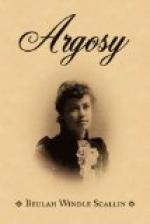Miss Kate Marsden has dared so much for these poor suffering ones that she will not easily be turned aside by excessive politeness or brutality on the part of officials from seeing the actual state of things. She will not, I think, be content with viewing the Provincial Prison at Tomsk, which is light and airy and occupied by local offenders, instead of the forwarding prison which, according to the accounts that reach us, is a disgrace to the civilized world, and where the exiles are lodged while waiting to be “forwarded.”
I pity Miss Kate Marsden if it should ever be her lot to witness the knout used to a woman without the power of stopping it, or retaliating upon the brute who is inflicting it. It would be almost the death of her.
If we have been successful in interesting the readers of THE ARGOSY in this lady and her mission, they will like to know that she is not a wilful person starting off on a wild-goose chase on a generous impulse without at all counting the cost. On the contrary, the work she is now doing has been the desire of her life, and all the training and discipline to which she has subjected herself has been for the purpose of fitting her for it.
From her earliest childhood she has been an indefatigable worker among the sick and wounded, with whom she has ever had the most intense sympathy, and consequently an extraordinary power to soothe and comfort.
Young as she was at the time of the Turko-Russian war, she did good service on the battle-fields and worked untiringly among every kind of depressing surrounding. The beautiful cross upon her breast is a gift from the Empress of Russia, as a recognition of the good work she did among the wounded soldiers at that time. From that day to this, whether in England or in New Zealand, her work has been steadily going on, ever gaining information and experience, and at the same time doing an amount of good difficult to calculate.
For one whole year she became, what I call for want of a better name, an itinerant teacher of ambulance work, in places out of reach of doctors in New Zealand. She taught the people how to deal with accidents caused by the falling of trees, cuts with the axe, or kicks from vicious horses, all of which are of frequent occurrence in the Bush. Again, she taught the miners how to make use of surrounding materials in case of an injury: how to bandage, and how to make a stretcher for moving a wounded person from one place to another with such things as were handy, viz., with two poles and a man’s coat, the poles to be placed through the arms and the coat itself to be buttoned securely over the poles. Another thing she taught in these out-of-the-way places was how to deal with burns and foreign matter in the eye or ear—also accidents of frequent occurrence.
Many interesting and exciting scenes could be related of this part of her life, but I hesitate to do more than show her training and fitness for the work she is now doing.




